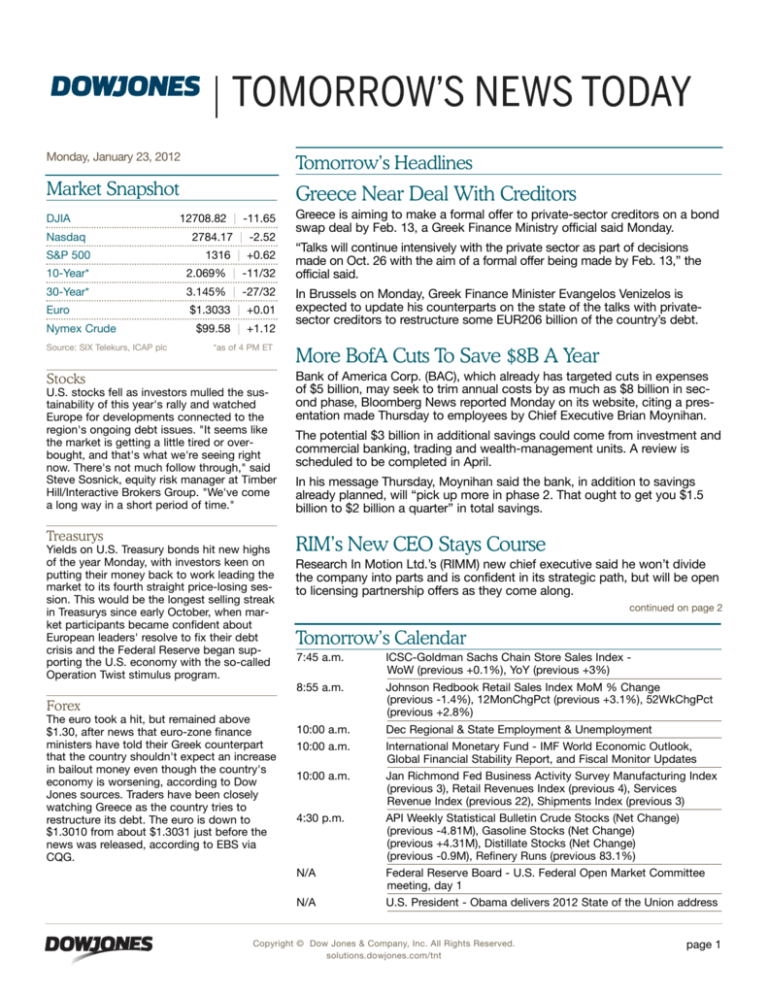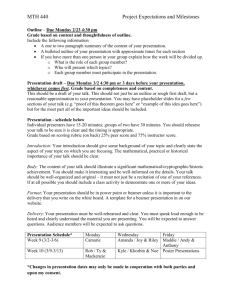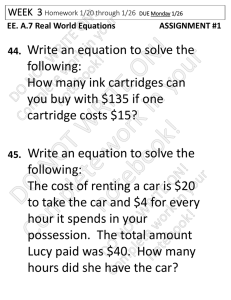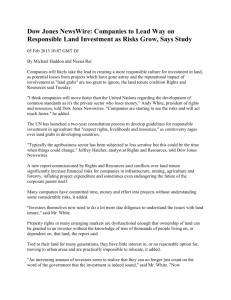
Monday, January 23, 2012
Tomorrow’s Headlines
Market Snapshot
Greece Near Deal With Creditors
DJIA
Nasdaq
12708.82 | -11.65
2784.17 | -2.52
S&P 500
1316 | +0.62
10-Year*
2.069% | -11/32
30-Year*
3.145% | -27/32
Euro
$1.3033 | +0.01
Nymex Crude
Source: SIX Telekurs, ICAP plc
$99.58 | +1.12
*as of 4 PM ET
Stocks
U.S. stocks fell as investors mulled the sustainability of this year's rally and watched
Europe for developments connected to the
region's ongoing debt issues. "It seems like
the market is getting a little tired or overbought, and that's what we're seeing right
now. There's not much follow through," said
Steve Sosnick, equity risk manager at Timber
Hill/Interactive Brokers Group. "We've come
a long way in a short period of time."
Treasurys
Yields on U.S. Treasury bonds hit new highs
of the year Monday, with investors keen on
putting their money back to work leading the
market to its fourth straight price-losing session. This would be the longest selling streak
in Treasurys since early October, when market participants became confident about
European leaders' resolve to fix their debt
crisis and the Federal Reserve began supporting the U.S. economy with the so-called
Operation Twist stimulus program.
Greece is aiming to make a formal offer to private-sector creditors on a bond
swap deal by Feb. 13, a Greek Finance Ministry official said Monday.
“Talks will continue intensively with the private sector as part of decisions
made on Oct. 26 with the aim of a formal offer being made by Feb. 13,” the
official said.
In Brussels on Monday, Greek Finance Minister Evangelos Venizelos is
expected to update his counterparts on the state of the talks with privatesector creditors to restructure some EUR206 billion of the country’s debt.
More BofA Cuts To Save $8B A Year
Bank of America Corp. (BAC), which already has targeted cuts in expenses
of $5 billion, may seek to trim annual costs by as much as $8 billion in second phase, Bloomberg News reported Monday on its website, citing a presentation made Thursday to employees by Chief Executive Brian Moynihan.
The potential $3 billion in additional savings could come from investment and
commercial banking, trading and wealth-management units. A review is
scheduled to be completed in April.
In his message Thursday, Moynihan said the bank, in addition to savings
already planned, will “pick up more in phase 2. That ought to get you $1.5
billion to $2 billion a quarter” in total savings.
RIM’s New CEO Stays Course
Research In Motion Ltd.’s (RIMM) new chief executive said he won’t divide
the company into parts and is confident in its strategic path, but will be open
to licensing partnership offers as they come along.
continued on page 2
Tomorrow’s Calendar
7:45 a.m.
ICSC-Goldman Sachs Chain Store Sales Index WoW (previous +0.1%), YoY (previous +3%)
8:55 a.m.
Johnson Redbook Retail Sales Index MoM % Change
(previous -1.4%), 12MonChgPct (previous +3.1%), 52WkChgPct
(previous +2.8%)
10:00 a.m.
Dec Regional & State Employment & Unemployment
10:00 a.m.
International Monetary Fund - IMF World Economic Outlook,
Global Financial Stability Report, and Fiscal Monitor Updates
10:00 a.m.
Jan Richmond Fed Business Activity Survey Manufacturing Index
(previous 3), Retail Revenues Index (previous 4), Services
Revenue Index (previous 22), Shipments Index (previous 3)
4:30 p.m.
API Weekly Statistical Bulletin Crude Stocks (Net Change)
(previous -4.81M), Gasoline Stocks (Net Change)
(previous +4.31M), Distillate Stocks (Net Change)
(previous -0.9M), Refinery Runs (previous 83.1%)
N/A
Federal Reserve Board - U.S. Federal Open Market Committee
meeting, day 1
N/A
U.S. President - Obama delivers 2012 State of the Union address
Forex
The euro took a hit, but remained above
$1.30, after news that euro-zone finance
ministers have told their Greek counterpart
that the country shouldn't expect an increase
in bailout money even though the country's
economy is worsening, according to Dow
Jones sources. Traders have been closely
watching Greece as the country tries to
restructure its debt. The euro is down to
$1.3010 from about $1.3031 just before the
news was released, according to EBS via
CQG.
Copyright © Dow Jones & Company, Inc. All Rights Reserved.
solutions.dowjones.com/tnt
page 1
Monday, January 23, 2012 4 p.m. ET
horizontal drilling and hydraulic fracturing, or fracking, have
transformed its potential.
Tomorrow’s Headlines
continued
Thorsten Heins, previously one of RIM’s two chief operating officers, was named chief executive by the company’s
board late Sunday in a corporate shake-up and will face
immediate scrutiny as he takes over the struggling
BlackBerry maker.
In a conference call Monday, Mr. Heins said the moves at
RIM don’t signal a “seismic change,” and he will mostly
stay on the path set by his predecessors.
“I will not in any way split this up or separate this into different businesses,” Mr. Heins said. “If there [are] requests
coming towards Research In Motion to talk about licensing
that platform to other companies, I will entertain those discussions. I will listen.”
Two areas Mr. Heins said the company does need to
improve upon are marketing in the key U.S. smartphone
market, and executing better with product rollout.
EU Agrees To Embargo On Iran Oil
European Union foreign ministers Monday agreed to enact
an oil embargo on Iran to take effect immediately on new
contracts and to impose a full oil embargo, including existing contracts, by July 1, EU diplomats said Monday.
Under the policy, EU countries would be barred from signing new contracts to import Iranian oil as soon as the
measures are officially published, expected Tuesday. But
these countries could still import Iranian oil through July 1
under contracts signed before the embargo was enacted.
A formal announcement by EU foreign ministers is expected early Monday afternoon.
In its most sweeping moves yet, the EU also agreed sanctions on Iran’s central bank and decided to ban Iranian
exports of petrochemical products from May 1. It also
added trade bank Bank Tejarat to its sanctions list, diplomats said.
The EU has agreed “unprecedented” sanctions on Iran,
U.K. Foreign Secretary William Hague told reporters on the
sidelines of a Foreign Ministers meeting that was ongoing
Monday. Hague said the move “shows the resolve of the
EU” to respond to “Iran’s continual breach” of international
agreements.
Apache To Buy Cordillera For $2.85B
Apache Corp. (APA), one of the biggest U.S. energy
explorers, is buying privately held Cordillera Energy
Partners III LLC for $2.85 billion in a deal that underscores
how new drilling techniques are remaking the U.S. oil business.
The cash-and-stock deal gives Apache 254,000 acres atop
a deeply buried layer of rock in what is known as the
Granite Wash, which straddles the Texas-Oklahoma border. Apache has been drilling in the area for 35 years, but
new methods of recovering oil and natural gas, including
The deal marks only the second time in the past 16 years
that Apache has purchased a company for more than $500
million. Apache has been buying into mature and still-profitable oil fields around the globe, a strategy that is leading
the company back into the region where it was formed 57
years ago.
Chesapeake Energy To Cut Production
Chesapeake Energy Corp. (CHK), one of the oil and gas
producers at the origin of the current natural gas supply
glut, said it will reduce drilling activity this year amid cratering prices for natural gas.
The announcement from the second-largest U.S. natural
gas producer after Exxon Mobil Corp. (XOM) helped send
Nymex natural gas futures for February to $2.432 per million British thermal units mid-morning Monday, up 8 cents
from Friday.
After drilling more U.S. gas wells in recent years than any
other company, Chesapeake, based in Oklahoma City, said
it was cutting spending as natural gas prices had unexpectedly reached its lowest levels in a decade. “An exceptionally mild winter to date has pressured U.S. natural gas
prices to levels below our prior expectations and below
levels that are economically attractive for developing dry
gas plays in the U.S., shale or otherwise,” said Chief
Executive Aubrey K. McClendon.
Court Strikes J&J Stent Patents
A federal court ruled that stents marketed by Boston
Scientific Corp. (BSX), Abbott Laboratories (ABT), and
Medtronic Inc. (MDT) don’t infringe on Johnson & Johnson
(JNJ) patents, the latest decision in the companies’ longrunning battle over intellectual property.
The two patents have to do with a drug used on stents.
Pfizer Inc.’s (PFE) Wyeth manufactures the drug, called
sirolimus, and licenses it to Johnson & Johnson’s Cordis
unit. The drug is used on Johnson & Johnson’s Cypher
stent, the first drug-eluting stent approved in the U.S.,
Boston Scientific’s Promus stent and Abbott’s Xience—
essentially the same stent—as well as Medtronic’s
Endeavor, use derivatives of the drug.
The U.S. District Court in New Jersey ruled that the
patents brought by Johnson & Johnson in lawsuits were
invalid. Johnson & Johnson said it plans to appeal the ruling and declined to comment on any financial impact from
the ruling.
Diamondback To Pay $9M In Settlement
Diamondback Capital Management, a U.S. hedge fund,
agreed to pay the government more than $9 million to put
insider-trading allegations behind it, while entering into a
nonprosecution agreement with federal prosecutors in
connection with a criminal investigation, federal authorities
said Monday.
Copyright © Dow Jones & Company, Inc. All Rights Reserved.
solutions.dowjones.com/tnt
continued on page 3
page 2
Monday, January 23, 2012 4 p.m. ET
Tomorrow’s Headlines
Starbucks To Expand Evening Menu
continued
Starbucks Corp. (SBUX) said it would expand its nascent
attempt to drum up evening business with beer, wine and
premium food at select locations in new regions.
Last week, the Securities and Exchange Commission
accused Diamondback, two of its former employees,
another hedge fund and five other individuals of civil insider-trading violations. Under Diamondback’s proposed settlement, the money manager will pay the government more
than $6 million in alleged illegal gains and interest from
trading in shares of Dell Inc. (DELL) and Nvidia Corp.
(NVDA) in 2008 and 2009, plus a $3 million civil penalty to
settle the SEC matter, the regulator and Manhattan U.S.
Attorney’s office said Monday.
Halliburton 4Q Net Up
Halliburton Co.’s (HAL) fourth-quarter earnings rose 50%
as the raging U.S. energy boom brought the oilfield-service
provider’s revenues to record levels.
The second-largest oilfield-service company after
Schlumberger Ltd. (SLB), Halliburton is the top seller of
hydraulic fracturing, or fracking, services in North America.
That service is essential in cracking open deeply buried oiland-gas-bearing rocks, including shale, an area on which
energy companies have been making big bets for future
growth. Last week, Schlumberger said its fourth-quarter
earnings rose 36% as a global drilling frenzy continued
despite fears about the global economy.
Kodak Names Restructuring Head
Eastman Kodak Co. (EKDKQ) said Monday it has retained
James A. Mesterharm as its new chief restructuring officer
to help steer the struggling film company through bankruptcy court, after Dominic DiNapoli held the role for just a
few days.
Kodak said the change “does not reflect any disagreement
or difference of opinion” between DiNapoli, a vice chairman at FTI Consulting Inc. (FCN), and the company. Kodak
had named DiNapoli its chief restructuring officer
Thursday, the same day it put itself into bankruptcy court.
Officials Cut Shale Resource View
U.S. energy officials have cut their estimates of natural gas
resources, saying Monday there is far less natural gas in a
region known as the Marcellus Shale than previously
thought.
Despite the downward revision in the amount of shale gas
that can be recovered, but not yet proven to exist, officials
at the Energy Information Administration said the U.S. will
still produce more natural gas than it needs in coming
years and will likely become a net exporter of natural gas
by 2021.
In a sneak peek Monday of its closely watched annual
energy report for 2012, the EIA said it thinks there are
about 480 trillion cubic feet of shale gas in the U.S., down
from earlier estimates of 830 trillion cubic feet.
The coffeeshop operator already runs the concept at five
stores in the Seattle area—the company’s original stomping ground—and one in Portland, Ore.
2013 Budget To Be Relased Feb. 13
The White House will release on Feb. 13 President Barack
Obama’s proposed budget for the federal government,
according to an administration official.
The White House has offered few details about what would
be in the budget, but President Obama said it would
include eliminating tax breaks for U.S. companies moving
jobs overseas, as well as tax benefits for firms that bring
jobs back from abroad.
Merkel Presses EU For Binding Pact
German Chancellor Angela Merkel on Monday called on
European leaders to make good on promises to create a
strong fiscal union to rescue the euro currency.
Merkel, speaking at the Konrad Adenauer Foundation, said
Europe’s completing a political union to bolster Europe’s
monetary union is the “greatest challenge” in the coming
years.
Shakeup In DOJ Antitrust Unit
Sharis Pozen, the Justice Department’s chief antitrust
enforcer, is preparing to leave her post, likely as soon as
this spring, according to people familiar with the matter.
Pozen, who has served as the acting head of the department’s Antitrust Division since August, is likely to return to
private practice, these people said. They said Pozen has
informed the White House of her intentions.
During her short tenure, Pozen has overseen one of the
department’s biggest merger challenges in a generation: its
successful bid to block AT&T Inc.’s (T) proposed $39 billion
acquisition of T-Mobile USA.
W Pincus To Raise $1B For Oil Buy
New York-based Warburg Pincus is looking for coinvestors to help it raise $1 billion for Venari Resources
LLC, a new deepwater exploration and production company, LBO Wire has learned.
The planned investment comes as other private equity
firms are capitalizing on previous bets on oil development
in the Gulf of Mexico nearly two years after the Deepwater
Horizon disaster raised concerns about the future of exploration in the region.
Warburg is committing $500 million to the new venture,
according to people with knowledge of the situation.
Copyright © Dow Jones & Company, Inc. All Rights Reserved.
solutions.dowjones.com/tnt
page 3
Monday, January 23, 2012 4 p.m. ET
Copyright Dow Jones & Company, Inc.
Talking Points
Tomorrow's News Today is made available
as a complimentary service to Dow Jones
News Service paying subscribers. No further redistribution is permitted without written permission from Dow Jones.
Tomorrow’s News Today is intended to provide factual information, but its accuracy
cannot be guaranteed. Dow Jones is not a
registered investment adviser, and under
no circumstances shall any of the information provided be construed as a buy or sell
recommendation or investment advice of
any kind.
Small-Cap Index Eyes Record High
Want to send a co-branded daily
version to your valued clients?
Dow Jones offers subscribing firms the
opportunity to co-brand Tomorrow's News
Today for redistribution to their clients. If
your firm is interested in co-branding, please
contact us at newswires@dowjones.com or
1.800.223.2274.
Overbought readings aside, price action in the Russell 2000 index of small capitalization stocks suggests further upside, with a return to last year’s all-time
high a viable target.
After running up 5.5% since the start of 2012, and nearly 30% off the early
October closing low, it wouldn’t be a big surprise to see the Russell 2000 pull
back. But there are a number of technical thresholds the index has surpassed
to suggest the current rally is part of a long-term uptrend, indicating any weakness should be viewed as a buying opportunity.
First, the index has sustained gains above the 200-day simple moving average,
which has acted as a pivot point—both support and resistance—since the
index was carving out a bottom in mid 2010, for the last couple weeks.
In addition, the Russell 2000 has climbed above the key 61.8% Fibonacci
retracement level—766.63—of the decline from the all-time high of 868.57 seen
in intraday trading on May 2, 2010 to the Oct. 4 intraday low of 601.71.
Many chart watchers feel if a retracement surpasses the Fibonacci ratio of
0.618, a new trend has begun. And the initial target of that trend becomes a full
retracement of the prior move.
Third, the index is above a downtrend line starting at the October highs around
the same time it rose above the 200-day SMA. Schaeffer’s Investment Research
senior vice-president of research Todd Salamone said the break of this “neckline” confirms a bullish “inverse head-and-shoulders” pattern, in which the
early-November and mid-December lows are the upside down shoulders, and
the late-November low is the head.
A measured-move target following the completion of this pattern is derived by
adding the height of this pattern—the distance from the top of the pattern to
the bottom of the head—to the breakout point. In this case, the target is around
860, which is right around the all-time high.
Just getting above some key technical levels isn’t necessarily enough to suggest the advance can return to prior highs, or that the downside will be limited.
Especially since some underlying momentum indicators have reached upside
extremes. But there’s more to the rally than just technical breakouts.
New Stimulus Could Be CounterProductive
U.S. President Barack Obama’s State of the Union speech set for Tuesday is
expected to focus on ways to help the economy. But proposals for new aid may
end up hurting the outlook.
Recent data indicate the U.S. recovery is sturdier. Economists expect real gross
domestic product grew at a solid 3.0% in the fourth quarter. Data so far in January
from regional factory activity to jobless claims show growth continued in early 2012.
Existing government help ensures growth will not stall again as it did in 2010
and 2011. The social security tax cut and extended jobless benefits provide
cash for consumers to spend. State and local budgets would be in far worse
shape if past federal aid had been absent.
So why should Obama tread carefully when suggesting new programs?
The potential negative comes not from the ideas themselves. More stimulus
would provide insurance that would come in handy if the euro zone implodes,
or if geopolitical tensions push up energy prices.
The danger comes down to politics and the upcoming election.
Any new legislation will run into the buzzsaw of political fighting. The squabbling is
certain to inject uncertainty and pessimism back into economic decision-making.
continued on page 5
Copyright © Dow Jones & Company, Inc. All Rights Reserved.
solutions.dowjones.com/tnt
page 4
Monday, January 23, 2012 4 p.m. ET
Talking Points
continued
Remember the protracted fight over lifting the debt ceiling
last August. Consumer sentiment nose-dived, amid a
record low level of confidence in Washington’s ability to
guide the economy.
Surveys of business sentiment also showed more pessimism, with the debt-ceiling debate and the downgrade of
Treasury debt given as reasons for the sour mood. The end
result: businesses took a wait-and-see attitude—which
hurt hiring.
While the recovery is looking better, growth is not surging.
Headwinds have diminished, but obstacles such as oversupply in housing, household deleveraging, and high
unemployment still hold back the economy’s potential
growth rate. A new dose of political uncertainty raises the
odds that 2012 will be the third consecutive year to see a
stall in growth.
Meet The Slow-Growth S&P 500
The days of double-digit earnings growth are over.
S&P 500 companies are on track to post earnings growth
of 9.5% year-on-year for the fourth quarter, according to
FactSet Research. At first glance, that may seem only a
slight miss from the double-digit earnings growth that previously powered this profit cycle. That headline figure,
however, is inflated by the earnings rebound of one specific company: the notorious AIG.
American International Group Inc. (AIG), which is still more
than three-quarters owned by the U.S. government after its
near-collapse in 2008, is expected to post earnings of 62
cents a share when it turns in results Feb. 23. That compares with a year-ago loss of a whopping $16.20.
Exclude AIG, and the estimated earnings-growth rate for the
financials sector—one of only two expected to report a double-digit gain for the quarter, along with energy—turns negative. For the S&P 500 as a whole, it falls from 9.5% to just
2.2%. That is a marked slowing from the average 16.3%
earnings growth rate that prevailed in the first three quarters
of 2011, according to Thomson Reuters. And it wasn’t anticipated: The share of companies that have missed their earnings estimates so far is the highest yet this cycle.
A rebound back to double-digit earnings growth at this
point would be unlikely. Indeed, analysts have gone from
expecting 14% earnings growth for the full year back in
July to about 9.6% now. And that figure, based on bottoms-up earnings estimates, may still be too high.
According to Barclays Capital strategist Barry Knapp, the
high ratio of earnings misses for the fourth quarter points
to a further slide in full-year forecasts. Stocks will have to
find another handhold to continue their climb.
Discover
Hidden
Treasure
Take a FREE 2-week trial!
www.diversifiedmarkets.dowjones.com
Get a head start over your competitors. DBR will save you time
on research and can lead you directly to the hidden treasure.
Copyright © Dow Jones & Company, Inc. All Rights Reserved.
solutions.dowjones.com/tnt
page 5









